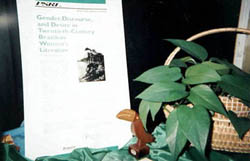Gender, Discourse, and Desire in Twentieth-Century Brazilian Women's Literature
Cristina Ferreira-Pinto
This study by Cristina Ferreira-Pinto explores the poetic and narrative strategies twentieth-century Brazilian women writers use to achieve new forms of representation of the female body, sexuality, and desire. Female writers discussed include: Gilka Machado, Lygia Fagundes Telles, Márcia Denser, and Marina Colasanti. While creating new forms, these writers are also deconstructing cultural myths of femininity and female behavior. In order to understand these myths, the book also presents new readings of some male-authored canonical novels by José de Alencar, Machado de Assis, Manuel Antônio de Almeida, and Aluísio Azevedo.
The specific focus on female sexuality and desire acknowledges the intrinsic link between sexuality and an individual’s sense of identity, and its importance for female identity, given the historical repression of women’s bodies and the double standard of morality still pervasive in many Western cultures.
In the discussion of the strategies Brazilian female poets and fiction writers employ, Ferreira-Pinto addresses some social and cultural issues that relate to a woman’s sense of her own body and sexuality: the characterization of women based on racial features and class hierarchy; marriage; motherhood; the silencing of the lesbian subject; and aging. Ferreira-Pinto’s analysis is informed by the works of various and diverse critics and theoreticians, among them Hélène Cixous, Teresa De Lauretis, Adrienne Rich, Gloria Anzaldúa, Georges Bataille, and Wilhelm Reich.
"Ferreira-Pinto often establishes bridges and connections between the texts discussed, always questioning the dominant male discourse. She combines careful research with new interpretative approaches, drawing on the work of well-established literary critics and adding new perspectives."—María José Somerlate Barbosa, University of Iowa
"Gender, Discourse, and Desire ... deals with multifaceted issues in connection with female eroticism and sexual life and examines how these issues have found expression in women-authored Brazilian literature. It also examines ties between constructions of sexuality, socio-ethnic dynamics and national identity. This book is both a valuable study and a stimulating invitation for further research on a number of demanding areas of inquiry."—Manuela Cook, Lusotopie
For the full text, see Lusotopie 13.1 (2006): 194-96.
"Cristina Ferreira-Piinto has produced an incisive book on twentieth-century Brazilian women's literature. Her highly detailed account is a worthy contribution to critical revisionism in this field." —Maria Figueredo, Hispania
For the full review, see Hispania 89.3 (Sept. 2006): 530-31.
"At a time when power relations are so intricately connected to discussions of national character and sexuality has guaranteed its proper place in our understanding of human identity, this nice volume is certainly more than welcome. Although literature is Ferreira-Pinto's main interest, cultural anthropologists and students of psychology, among others, will find her work illuminating." —Antonio Luciano de Andrade Tosta, Brasil/Brazil
For the full review, see Brasil/Brazil (July 2007): 108-10.
"… carefully researched and engaging study … the author demonstrates how a new language of feminine eroticism has emerged, but also highlights some of the pitfalls inherent in this process. … This study will be of interest to anyone concerned with gender studies and the literary and cultural construction of female identity in twentieth-century Brazil. Considering the diverse selection of twentieth-century women writers in her analysis, it also serves as a useful introduction to contemporary Brazilian women's poetry and fiction writing and to the critical literture available on it." —Charlotte Liddell, Bulletin of Hispanic Studies
For the full review, see Bulletin of Hispanic Studies 84 (2007): 538-39.
"Ferreira-Pinto has given us a perceptive, thoughtful and innovative discussion of the female erotic in contemporary Brazilian women's writing. ... Overall, this volume succeeds in addressing the urgent need for English language material on some of Brazil's best writers of the twentieth century while providing a captivating treatment of a wide range of gender-related discursive issues. ... a dynamic discussion suitable for classroom use at both the undergraduate and graduate levels." Peggy L. Sharpe, Luso-Brazilian Review 47.1 (2010): 229-31.
For more reviews of this book, see
Choice 42.6 (Feb. 2005): 1025-26 (K. D. Jackson)
Cristina Ferreira-Pinto, Texas State University–San Marcos, was born and raised in Rio de Janeiro, Brazil. She holds a PhD in Brazilian and Spanish American literatures from Tulane University. Her major fields of research are Brazilian literature and feminist theory, and she has published numerous essays in academic journals in Brazil, the United States, and Spain.
1-55753-352-0
2004. Vol. 29. xiv, 208 pp. Paper $32.95


Display case in Stanley Coulter Hall, the week the book appeared.
Information last updated June 24, 2015.
For further information about this book, contact the production editor at clawsons@purdue.edu